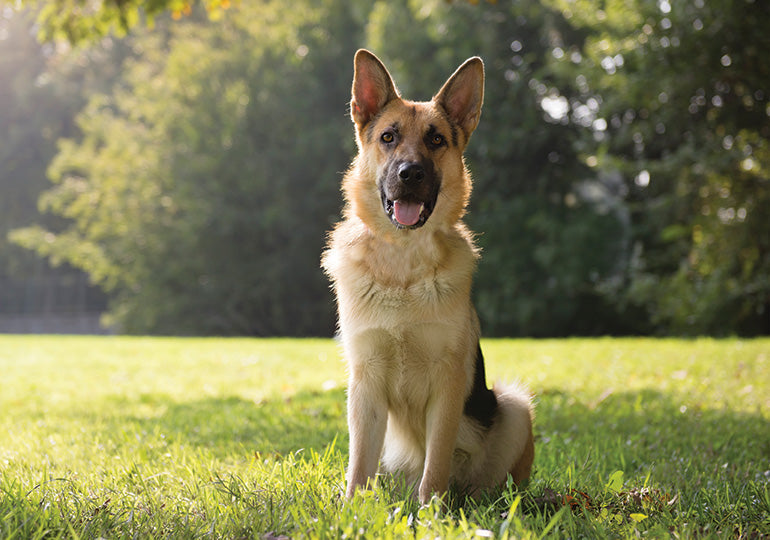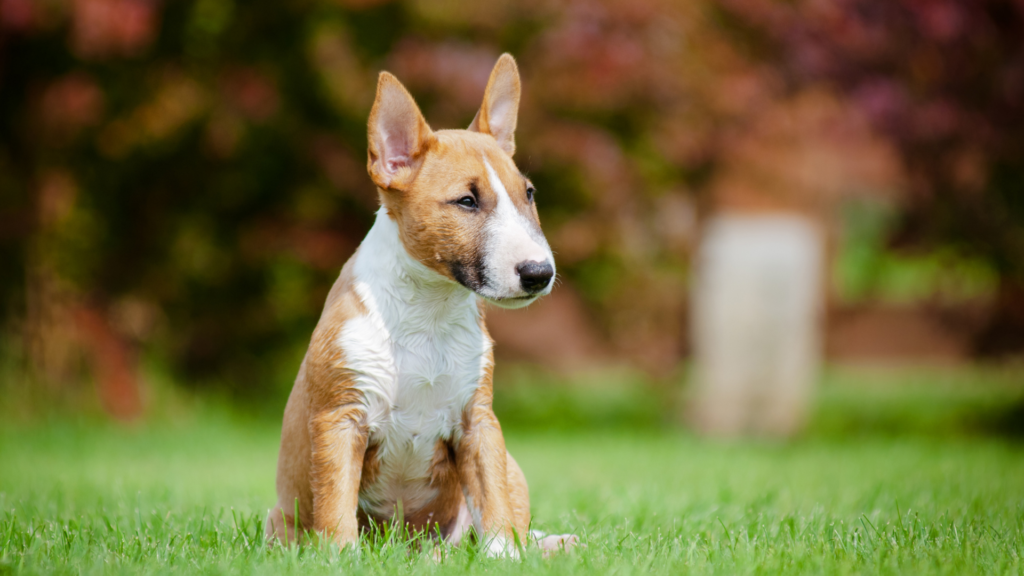
German Shepherd Dog Breed: Temperament, Training & Trusted Care Guide
Confident, courageous and loyal—the German Shepherd is one of the most respected and recognisable dog breeds in the world. Whether serving as a working dog, a devoted family companion, or a protective guardian, this intelligent breed has earned its reputation for versatility and excellence.
Quick Facts Overview
|
Trait |
Details |
|
Size Category |
Large |
|
Height & Weight |
Height: 55–65 cm; Weight: 22–40 kg |
|
Coat Type & Colours |
Medium-length double coat; black & tan, sable, black, white |
|
Energy Level |
Very High |
|
Origin |
Germany |
|
Grooming Needs |
Moderate |
|
Temperament |
Alert, confident, loyal, intelligent |
|
Trainability |
Excellent |
|
Compatibility |
Good with kids and other pets (with training) |
|
Lifespan |
9–13 years |
Breed Origins and History
The German Shepherd was developed in late 19th-century Germany by Captain Max von Stephanitz, who wanted to create the ideal herding dog—intelligent, strong, and responsive.
Originally bred for livestock management, the breed quickly gained international recognition for its capabilities in police work, military service, and as a loyal protector.
Personality and Temperament
German Shepherds are deeply loyal and highly protective of their families. Their temperament blends alertness with affection, making them excellent watchdogs and family guardians.
While they may be aloof with strangers, early socialisation ensures a well-rounded and confident companion. They're not just workers—they’re also incredibly loving when given proper attention and purpose.
Trainability and Intelligence
German Shepherds are among the most intelligent dog breeds globally. They excel in obedience, agility, scent detection, and advanced task training.
Their strong work ethic and desire to please make them a dream for experienced trainers. However, without mental stimulation, they may become anxious or destructive.
Recommended Gear:
Exercise and Activity Requirements
Daily Requirements:
-
90+ minutes of daily exercise
-
Mental stimulation through training, games, or puzzle feeders
-
Agility, tracking, and advanced obedience training
Without proper exercise and stimulation, German Shepherds may develop behavioural issues such as digging, barking or chewing. Structured activities are key to their wellbeing.
Recommended Gear:
Physical Characteristics
-
Muscular, athletic frame with a noble stance
-
Strong jaws, alert ears, and a bushy tail
-
Medium-length, double coat with seasonal shedding
German Shepherds are both striking and strong. Their iconic black and tan coats are most common, but they also come in sable, black, and even white.
Regular grooming helps manage shedding, especially during seasonal changes.
Recommended Gear by Size:
Living Environment Suitability
This breed thrives in homes with space to roam and an active family. While not ideal for small apartments, they can adapt if given adequate daily activity and mental engagement.
They do not tolerate long periods of isolation well and should be part of the daily family routine.
Recommended Gear:
Grooming and Maintenance
Grooming Checklist:
-
Brushing several times a week
-
Bathing every 6–8 weeks or as needed
-
Ear cleaning, nail trimming, and dental care
German Shepherds are heavy seasonal shedders. A proper grooming routine prevents matting and keeps their coat healthy. Their love of activity also means checking for ticks or debris after outings is important.
Recommended Grooming Gear:
Common Health Issues
Breed-Specific Concerns:
-
Hip and elbow dysplasia
-
Degenerative myelopathy
-
Bloat (gastric torsion)
-
Allergies and skin sensitivity
Work with responsible breeders who screen for joint and spine issues. A proper diet, regular exercise, and weight management are essential to prolong your dog’s active years.
Recommended Health Gear:
Diet and Feeding Guidelines
Feeding Plan:
-
Puppies: 3 small meals daily
-
Adults: 2 balanced meals per day
-
High-protein diet for muscle support
This breed needs a well-structured diet to support their energy levels and joint health. Look for quality ingredients and avoid fillers that may trigger allergies or digestive issues.
Recommended Feeding Gear:
Compatibility with People and Other Pets
Compatibility Scale:
-
Children: ★★★★☆ (with training)
-
Other Dogs: ★★★★☆ (early socialisation needed)
-
Small Pets: ★★★☆☆ (strong prey drive—supervision required)
They’re loyal, loving, and form deep bonds with their family. With early exposure and training, they adapt well to other pets. Their protective instincts, however, mean supervision is important in unfamiliar social settings.
Recommended Gear:
Behavioural Issues and Management
Common Issues:
-
Overprotectiveness or suspicion of strangers
-
Separation anxiety
-
Pulling or leash reactivity
Management Tips:
-
Begin training and socialisation early
-
Use daily routines and confidence-building exercises
-
Avoid punishment—reward-based training works best
Helpful Gear:
Essential Gear for German Shepherds
Walking & Outdoor:
Style & Identification:
Training:
Travel & Safety:
Weather Gear:
Personalisation:
FAQs: German Shepherd
1. Is a German Shepherd a good family dog?
Yes, German Shepherds can be excellent family dogs. They are loyal, protective, and intelligent. With proper socialisation and training, they are affectionate with their families and gentle with children.
2. Can a German Shepherd be left alone during the day?
German Shepherds can be left alone for a few hours, but they are social and intelligent dogs that need regular mental stimulation. Long hours alone can lead to boredom or anxiety, so providing enrichment or a midday break is ideal.
3. Do German Shepherds bark a lot?
German Shepherds are vocal and will bark to alert their owners or express excitement. While they are not nuisance barkers by default, without enough physical or mental activity, they may bark excessively out of frustration or boredom.
4. What are the weaknesses of a German Shepherd?
Common weaknesses include a tendency toward separation anxiety, shedding, and potential health issues such as hip dysplasia. They also require a high level of daily exercise and training, which may not suit every household.
5. Are German Shepherds good house dogs?
Yes, German Shepherds can adapt well to indoor living as long as they receive daily physical activity and mental stimulation. They are clean, trainable, and form strong bonds with their household, making them excellent indoor companions.
6. Do German Shepherds have behaviour problems?
Without proper training and structure, German Shepherds can develop behaviour issues such as over-protectiveness, excessive barking, and destructive behaviour. These are typically preventable with early socialisation and consistent training.
7. What are the pros and cons of a German Shepherd?
Pros: Loyal, intelligent, trainable, protective.
Cons: High energy, heavy shedding, prone to certain health conditions. They require an active lifestyle and a committed owner to thrive.
8. Are German Shepherds good around kids?
Yes, German Shepherds can be very good with children, especially when raised with them. They are naturally protective and gentle, but should always be supervised around young kids due to their size and strength.
9. How much walking does a German Shepherd need?
A healthy adult German Shepherd needs at least 1.5 to 2 hours of exercise per day. This can include walks, structured play, obedience work, or agility. Without enough activity, they may become restless or develop behavioural issues.
10. Are German Shepherds still called Alsatians?
In some parts of the UK and Ireland, German Shepherds are still referred to as Alsatians. The term "Alsatian" was originally used after World War I due to anti-German sentiment, but both names refer to the same breed.
11. What is the difference between an Alsatian and a German Shepherd?
There is no difference — "Alsatian" is simply an alternate name for the German Shepherd. The breed standard, appearance, and traits are the same regardless of which name is used.
Final Thoughts
The German Shepherd is a brilliant choice for active households, dog-savvy owners, and those seeking a loyal and protective companion. With proper training, care, and daily attention, they become true family legends.
Looking for durable gear tailored for your German Shepherd’s active lifestyle?
Visit EzyDog to shop trusted accessories that keep up with their strength and smarts.




Leave a comment
This site is protected by hCaptcha and the hCaptcha Privacy Policy and Terms of Service apply.